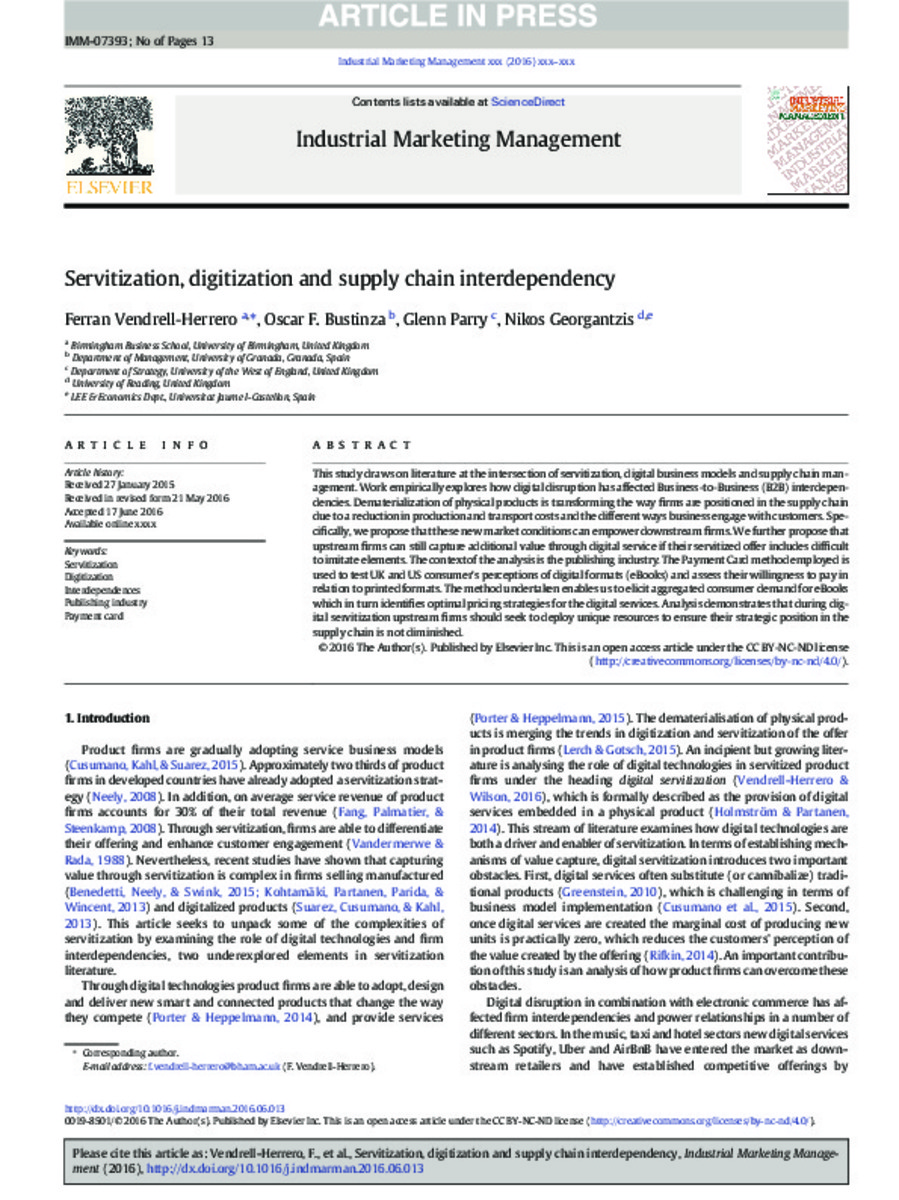Mostrar el registro sencillo del ítem
Servitization, digitization and supply chain interdependency
| dc.contributor.author | Vendrell-Herrero, Ferran | |
| dc.contributor.author | Bustinza, Oscar F. | |
| dc.contributor.author | Parry, Glenn | |
| dc.contributor.author | Georgantzis, Nikolaos | |
| dc.date.accessioned | 2016-07-21T09:30:12Z | |
| dc.date.available | 2016-07-21T09:30:12Z | |
| dc.date.issued | 2016-06-30 | |
| dc.identifier.citation | VENDRELL-HERRERO, Ferran, et al. Servitization, digitization and supply chain interdependency. Industrial Marketing Management, 2016 | ca_CA |
| dc.identifier.issn | 0019-8501 | |
| dc.identifier.uri | http://hdl.handle.net/10234/161829 | |
| dc.description.abstract | This study draws on literature at the intersection of servitization, digital business models and supply chain management. Work empirically explores how digital disruption has affected Business-to-Business (B2B) interdependencies. Dematerialization of physical products is transforming the way firms are positioned in the supply chain due to a reduction in production and transport costs and the different ways business engage with customers. Specifically, we propose that these new market conditions can empower downstream firms. We further propose that upstream firms can still capture additional value through digital service if their servitized offer includes difficult to imitate elements. The context of the analysis is the publishing industry. The Payment Card method employed is used to test UK and US consumer's perceptions of digital formats (eBooks) and assess their willingness to pay in relation to printed formats. The method undertaken enables us to elicit aggregated consumer demand for eBooks which in turn identifies optimal pricing strategies for the digital services. Analysis demonstrates that during digital servitization upstream firms should seek to deploy unique resources to ensure their strategic position in the supply chain is not diminished. | ca_CA |
| dc.description.sponsorShip | The authors would like to acknowledge the comments provided on early versions of this article by Professor Stan Siebert and Prof. Paul Edwards, comments received by attendees at ICBS 2014 and EUROMA 2015 conferences, and three anonymous referees. This research was supported by the European Commission under the Horizon 2020 Marie Skłodowska-Curie Actions project “MAKERS: Smart Manufacturing for EU Growth and Prosperity” with grant agreement number 691192, the Spanish Government under Grant ECO2014-58472-R, and the Junta de Andalusia under Grant P11-SEJ-7294. | ca_CA |
| dc.format.extent | 13 p. | ca_CA |
| dc.format.mimetype | application/pdf | ca_CA |
| dc.language.iso | eng | ca_CA |
| dc.publisher | Elsevier | ca_CA |
| dc.relation.isPartOf | Industrial Marketing Management, 2016 | ca_CA |
| dc.rights | © 2016 The Author(s). Published by Elsevier Inc. This is an open access article under the CC BY-NC-ND license (http://creativecommons.org/licenses/by-nc-nd/4.0/). | ca_CA |
| dc.rights.uri | http://rightsstatements.org/vocab/InC/1.0/ | * |
| dc.subject | Servitization | ca_CA |
| dc.subject | Digitization | ca_CA |
| dc.subject | Interdependences | ca_CA |
| dc.subject | Publishing industry | ca_CA |
| dc.subject | Payment card | ca_CA |
| dc.title | Servitization, digitization and supply chain interdependency | ca_CA |
| dc.type | info:eu-repo/semantics/article | ca_CA |
| dc.identifier.doi | http://dx.doi.org/10.1016/j.indmarman.2016.06.013 | |
| dc.rights.accessRights | info:eu-repo/semantics/openAccess | ca_CA |
| dc.relation.publisherVersion | http://www.sciencedirect.com/science/article/pii/S0019850116301213 | ca_CA |
| dc.type.version | info:eu-repo/semantics/publishedVersion |
Ficheros en el ítem
Este ítem aparece en la(s) siguiente(s) colección(ones)
-
ECO_Articles [693]







